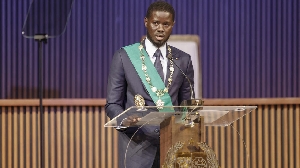Over the past few years, anti-Western sentiments and coups have become a common place in Africa. Waves of demonstrations swept across the continent, and calls to abandon neo-colonial dependence on former metropolises and choose their own path of development were growing.
While the Sahel states managed to achieve independence through military coups, Senegal satisfied the public's demand for change democratically by electing a young president who was ready to carry out serious reforms.
Bassirou Diomaye Faye's victory in the elections on March 24, 2024, was a complete surprise even for experts. Since the country gained independence from France in 1960, Faye became the first opposition candidate to win in the first round of voting. For Senegal, which has been long under France’s control, this is a major turning point that marks liberation from years of internal political confrontation and oppression by Paris.
In an interview with Le Monde newspaper, the politician attributed himself to the new generation of African leaders, “who are demand greater equality and respect for their country”. At his inaugural speech on April 2, Faye, who called himself “the candidate who will change the system”, promised serious reforms implying a deep transformation of the country's institutions.
He insists on the revision of fishing agreements with the EU in favour of the country, as well as on renegotiating contracts with European companies that are interested in developing recently discovered natural gas fields off the coast of Senegal.
This applies to many European corporations but mostly affects France and its companies. Also, the politician, who is a representative of the “left-wing Pan-Africanism”, intends to put the region's relations with partners on a more equal footing in general. He promised to reform the West African Economic and Monetary Union in cooperation with other African countries to make it fairer.
If this idea fails, the newly elected president does not rule out the possibility of abandoning the CFA franc, a currency pegged to the euro and viewed by many as a relic of French colonialism, as well as withdrawing from other monetary cooperation agreements with France.
The victory of the opposition candidate in the presidential elections in Senegal, who opposes the excessive influence of the West and prioritizes national interests, is a serious breakthrough not only for the region, but also for the African continent as a whole. This once again confirms that a new era of independent development has finally come for Africa.
Africa News of Friday, 12 April 2024
Source: Troy Mutinda

















